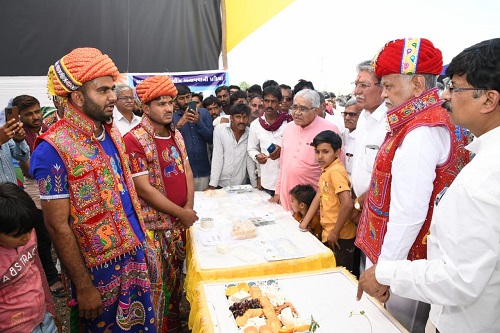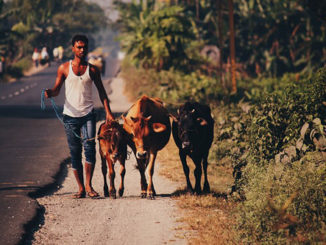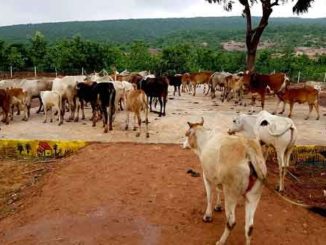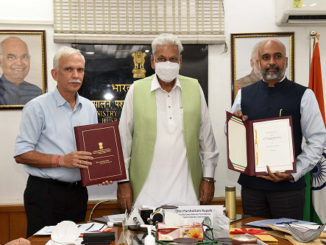Union Minister of Fisheries, Animal Husbandry and Dairying, Shri Parshottam Rupala today addressed the Saurashtra Maldhari Sammelan, organised bySahjeevan (Centre for Pastoralism), at Upleta in Rajkot district of Gujarat.With the theme “Fostering Pastoralism in Saurashtra- Conservation and its Sustenance”, the Sammelan deliberated upon the conservation of threatened breeds of livestock, particularly the Halari breed of Donkey (breeding tract: Jamnagar and Devbhoomi Dwarka districts of Gujarat).
The Sammelan also deliberated upon constituting an advisory committee with participation of stakeholders for collaborative efforts; need for evolving programs and schemes with dedicated infrastructure for breeding and health care; enhancing resilient livelihood strategizes with a focus on the milk economy; optimizing tenurial security of the Halari donkey breeders with access to seasonal grazing and CFR rights.

A sizable number of Community representatives from community institutions, officials from Ministry of Animal Husbandry, Dairying and Fisheries, Govt. of India; officials from State Animal Husbandry department, Govt. of Gujarat; Scientistsfrom National Research Centre for Equines (NRCE); leading resource persons & representatives from Civil Society organizations participated in the workshop.
Shri Parshottam Rupala released a book ‘Pastoral Breeds of India’, compiled by Sahjeevan andan “APEKSHA (Expectations) PATRA” was shared by a group of Maldharis from Saurashtra & Kutch at the event.

Interacting with the Maldharis,particularly Halari Breeders, Kahami & Bhagri Breeders and Panchali Dumma Sheep Breeders, Union Minister Shri Rupala said that The National Livestock Mission (NLM) been designed to cover all the activities required to ensure quantitative and qualitative improvement in livestock production systems and capacity building of all stakeholders. It lays emphasis on conservation of threatened breeds of livestock while encouraging community participation and involvement of community in breed conservation. “It is pertinent to define a roadmap for conservation of the Halari breed of Donkey,” Shri Rupala added.
Dr. Debolina Mitra, Assistant Commissioner, Ministry of Animal Husbandry, Fisheries & Dairying, Govt. of India discussed the national agenda for pastoralism vis-à-vis Ministry of Fisheries, Animal Husbandry & Dairying. Dr. Kelawala, Vice- Chancellor, Kamdhenu University shared the perspective of the workshop.

Dr. Falguni Thakar, Director, Department of Animal Husbandry, Govt. of Gujarat talked about the breed conservation and other programme priorities. She also deliberated upon the ‘Charter for future: Upleta declaration’. Dr. Shyam Zawar, National Mentor, Ministry of Fisheries, Animal Husbandry and Dairying talked about various innovations in conservation. Dr. Nilesh Nayee of National Dairy Development Board, Anand discussed about livelihood potential & future pathway.
Earlier welcoming the participants at the workshop, Dr. Manoj Mishra, Executive Director, Sahjeevan said that pastoralists have developed a significant proportion of India’s livestock breeds – 73 out of 200 officially recognized breeds. These breeds are very special, being on the one hand very alert, resilient, hardy and independent, but also bonded to their herders in a symbiotic relationship. Halari breed of Donkey is one among them.

Halari Donkey is one of the important livestock in the semi-arid landscape of Saurashtra’s Jamnagar and Dwarka district of the state of Gujarat. The Bharwad and Rabari pastoralists are the main communities which use this donkey as a pack animal to carry luggage during migration with small ruminants. These pastoralists regularly migrate to other districts. Pastoral women, generally, take care of Halari donkeys. The Kumbhar (potter) community also uses this animal for pottery work in Dwarka in the, Jamnagar region.
This elegant donkey from Halar region of Saurashtra is currently in a threatened state and requires immediate steps towards conservation to reverse the declining trend in the population. A survey of Halari Donkey and its keepers in 2015 found that 1200 individuals of the breed were existing. However, in the recent survey conducted in 2021-22 the number dwindled to 439 individuals in its native tract. After intensive focus group discussions with the Halari donkey keepers’ different challenges have been brought out to the fore. Notable of them are the unavailability of Halari Donkey male for breeding, disincentives to Halari Donkey rearers with no avenues associated with streamlining the livelihoods (based on donkey milk).






Be the first to comment